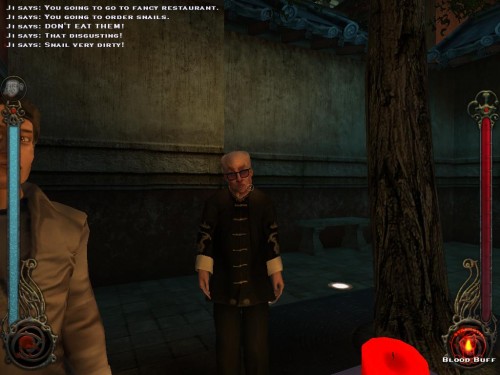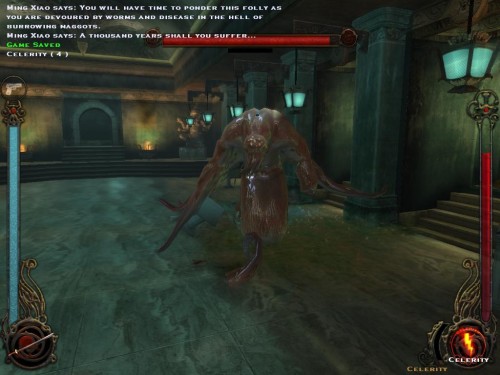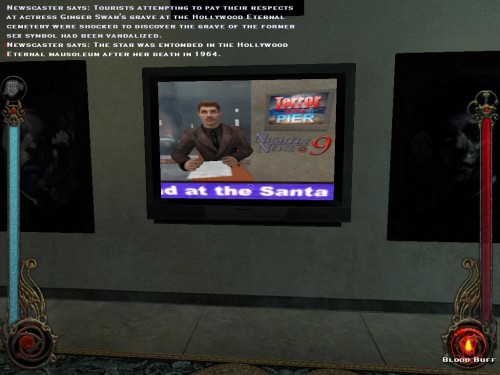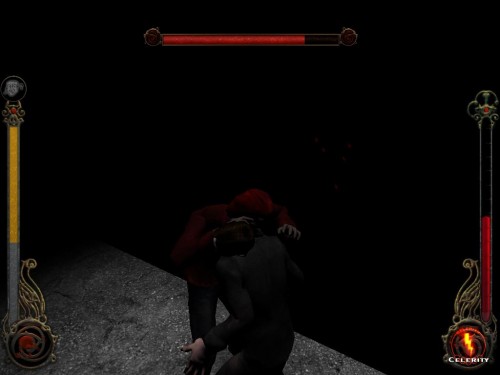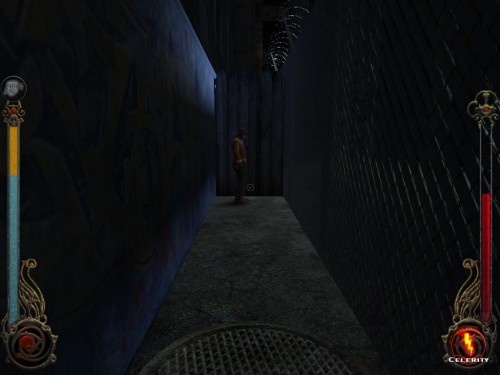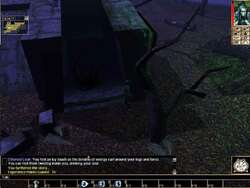Vampire: The Masquerade - Bloodlines Review
Vampire: The Masquerade - Bloodlines Review
Codex Review - posted by Spazmo on Mon 29 November 2004, 22:38:46
Tags: Troika Games; Vampire: The Masquerade - BloodlinesWe've got our own take on Troika's Vampire RPG. Read on. Here's the opening paragraph because you don't get to see the end unless you read the whole thing, you cheater.
It was around this time last year that Troika Games released their second game, Temple of Elemental Evil. The game, publisher and largely the teams are all different, but the stakes for the company seem about the same. Both games follow a Troika title that wasn't quite as good or successful as fans--and those who certainly aren't fans--would have liked them to be. Both games are a chance for the company to really make a name for itself and show that years after Fallout, the game that got it all right, and Arcanum, the game that got lots of it right, the Troika team still had it. And, unfortunately for this new game, Vampire: The Masquerade - Bloodlines, both games, while being quite good in their own right, don't fully make up for all the mistakes made in the company's previous effort and, woefully, make new ones of their own.
Sympathy for the Devil
It was around this time last year that Troika Games released their second game, Temple of Elemental Evil. The game, publisher and largely the teams are all different, but the stakes for the company seem about the same. Both games follow a Troika title that wasn't quite as good or successful as fans--and those who certainly aren't fans--would have liked them to be. Both games are a chance for the company to really make a name for itself and show that years after Fallout, the game that got it all right, and Arcanum, the game that got lots of it right, the Troika team still had it. And, unfortunately for this new game, Vampire: The Masquerade - Bloodlines, both games, while being quite good in their own right, don't fully make up for all the mistakes made in the company's previous effort and, woefully, make new ones of their own.
There lies a special challenge in reviewing a game about vampires like Bloodlines that you don't get when reviewing other games. I am talking, of course, about avoiding painfully obvious and terrible puns about vampires. Thus, I am determined to avoid the use of phrases like "sink my teeth into this ambitious title" or "this game bites--literally!"
Midnight Rambler
Bloodlines takes its interesting and well-developed setting from the popular and eponymous Vampire: The Masquerade pen and paper RPG by White Wolf. The world of V:tM is one where vampires, among other creepie crawlies, actually do exist among us. Being aware, however, of the fact that they're grossly outnumbered and outgunned by humanity, the vampires of this fictional reality have devised a great big plan to hide themselves from mortals called the Masquerade. Ruthlessly enforced by a central vampire authority called the Camarilla, the Masquerade ensures that regular people don't catch on to the existence of the undead and start stabbing the eerily pale among us with broken pool cues and other handy pointy wooden objects. Of course, not all vampires comply with the Camarilla's laws, and from there we get a storyline.
The advantage to using an existing setting is that, hopefully, what you're getting is a superbly fleshed out, detailed, deep and well thought out game world, and White Wolf does deliver on this. Even if you're really not into vampires at all, you can't help but be intrigued by the complex politics and secret society skullduggery that the game's vampires incessantly engage in. Troika also does a good job of giving the game more of an urban underworld feel than a depressing (or rather hilarious) goth ambiance. Perhaps the most appealing thing about this setting is that it's not the same old elf-and-dwarf fantasy world that's been inflicted upon RPG fans for years.
The narrative that unfolds as the game progresses is equally interesting, although some of the endings are very weak and fail to provide the resolution that is built up to by the game's last few sequences. For most of the game, though, the story will keep you interested. The game begins with your character being seduced by a mysterious person of the opposite sex and then illegally sired, or made into a vampire. The Camarilla, who strictly regulate the creation of new vampires as well as several other aspects of vampire life, immediately intervene. Your sire and yourself are brought before Prince LaCroix, the leader of the Camarilla vampires in Los Angeles, the California metropolis where the game takes place. Your sire is swiftly executed for his/her transgression against the Masquerade. The prince is about to do the same to you when Nines Rodriguez, leader of the Anarch faction of vampires, who refuse to submit to Camarilla rule and represent a fair part of Los Angeles' vampires, intervenes to save your life. The prince then decides to show mercy and lets you live with the condition that you work for him to repay him for your (un)life. From there, the plot of the game takes off as the prince sends you on a series of missions which largely revolve around an ancient artifact recently arrived in the city that is somehow related to a large and dramatic event called Gehenna, the vampire apocalypse. Much of the game centers on this object and the various vampire faction's efforts to grab it in order to do what they want with it, but the artifact really only serves as a catalyst for the struggle over the control of LA's vampire underworld between the various sects of the city, which is where the real meat of the story is.
In general, the storyline is very tight and interesting, taking you through a whirlwind of backstabbing, deception, duplicity, manipulation and all the other things that make up a good politics-driven storyline, but there's a price to pay for that: it's largely set in stone. Regardless of what factions you pick or decisions you make, your course through the gameworld won't significantly change. You can downright curse out the prince and he'll still just send you out on another quest. It's only right near the end of the game that you actually get to decide how the plot will end, and this choice is totally independent of your prior actions and choices. You just choose a particular choice in a dialog and you've picked your ending. The story does a good job of offering a valid reason why the loyalties you've held through the entire game might change, but that the story only hinges on one or two choices is disappointing.

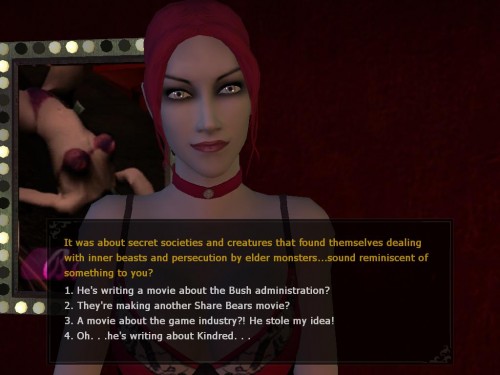
Gotta love the swingin' vampire nightlife. All the sly political humor is getting in the way of the JiggleTech demo, though
The characters are well developed and engaging, with a lot of memorable personalities (Officer Chunk is my personal favorite). Probably one of the more important reasons why the NPCs in Bloodlines seem so fleshed out is because each one of them is fully voiced and has a fully animated face, much like BioWare's Star Wars: Knights of the Old Republic. The difference, though, is that every important NPC in Bloodlines gets a unique and superbly rendered face. Great writing and characters always helps and the game has certainly got both, but Bloodlines' skillful use of facial animation technology and generally good voice acting really help the NPCs shine in dialog.
On the positive side, Bloodlines does deserve some praise for how the game world reacts to your various actions. In dialog, NPCs will sometimes offer different responses based on your past actions. What's especially neat is that Bloodlines features a TV newscast for the Los Angeles area with many stories that directly relate to you and the things you've been doing in the game. After you complete a particularly remarkable quest (like causing certain large explosions in certain places), it'll probably end up on the news. It's really neat to be investigating a serial killer and finding new murder scenes and having the reporter on TV be right behind you with a story about the new body. You can even get quests from the television. It's pretty easy to do but it does wonders for immersion. Another fun thing in the game is a Grand Theft Auto-style talk radio station you can listen to if you find a radio. This won't react to your actions like the TV will, but it's good for a laugh. Finally, in the game, you are given an apartment or two (called your "haven") where you have a computer. You can check your email and actually get quests through it. It's a really well implemented gameplay element and just makes sense in a modern-day setting game.
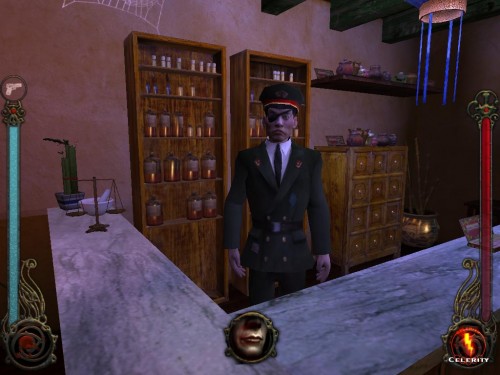

A shot of the lovable eyepatch wearing arms herbal remedies dealer and something those remedies would have been handy for
Start Me Up
Along with the setting, Bloodlines takes from the pen and paper Vampire: The Masquerade much of its rule system. Vampire's system isn't quite as detailed as other systems like Dungeons & Dragons, but it still works. In any case, a rules light system is probably best for a game like Bloodlines, which is going to toss out a lot of those rules to replace them with its own actiony combat system--more on that later.
The rule system used here is simple, intuitive and functional, which is always good. Characters will get attributes and skills they can spend points on. Attributes are things like your strength, your dexterity, your wits, your perception, your appearance and others. These essentially represent your inherent nature and each ranges from one to five. Your character's skills are abilities that you might learn as you go through your unlife, like brawling, scholarship, security (lockpicking), hacking, ranged combat (guns) and others. Skills also range from one to five. Each attribute and skill contribute to your total rating in a feat. For example, your melee feat, which is the statistic that reflects your skill at fighting with weapons, is the sum of your strength attribute and your melee skill. Your hacking feat is the sum of your wits attribute and computer skill. The various combat feats affect how good you are at hurting others and avoiding being hurt yourself. The rest of your feats are checked against the difficulty of various actions in the world. Hacking this computer or convincing that thug to let you past him will have a particular minimum skill rating attached to it and if you equal or surpass that skill, you've succeeded.


The game is full of little jokes like these, with references to the developers being particularly rampant
Inherently, being a vampire is kind of a raw deal. You get really pale, creepy and develop a taste for blood. The trade off is eternal life--which is okay, I guess--and superpowers, which the game calls disciplines. When creating your character, you pick one of seven clans to become a member of. Your choices here reflect a fairly broad range of RPG archetypes. You can play a Brujah, passionate, violent types who excel at combat. The Gangrel are vampires who who identify with animals and the Beast inside all vampires that represents the instinctual hunger for blood. Their powers include the ability to summon animals to help defeat enemies. Malkavians are insane vampires with a twisted insight into events. What's interesting about being Malkavian is that your character effectively will be a complete lunatic and your dialog options will reflect this, which is really great. Unfortunately, as you progress through the game and approach the final areas, it seems less and less effort was invested into Malkavian dialog and their general insanity and your gameplay experience loses that completely loopy charm. Nosferatu are Kindred twisted by the blood curse into horrific and ugly monsters who excel at stealth and information gathering. Toreador are passionate artists and thrive in human society (as long as it's at night). The Tremere are magicians who have developed a blood magic called Thaumaturgy. Finally, The Ventrue are the political leaders of the Camarilla and excel at politics and negotiation. Each clan has some bonuses or penalties associated with it (for example, since they spend so much time studying their magic, the Tremere clan's physical statistics can never rise above four). More importantly, however, each clan gets a set of three disciplines (along with one discipline, blood buff, that all vampires get which improves your physical statistics). This makes your choice of clan probably the most important choice you'll make when creating your character, and this is mostly because each clan gets a particular set of disciplines.
The Brujah clan gets Celerity, Potence and Presence. Respectively, these disciplines give you super speed, super strength or debuff enemies. The Brujah are thus ideal fighters. Gangrel get Animalism, allowing them to summon supernatural animals, Fortitude, which makes them tougher in combat and Protean, which lets them assume characteristics of animals, increasing their effectiveness in combat. Malkavians, in accordance with their insanity, can use Auspex, which increases perception and wits and also lets you see the aura of creatures (essentially lets you identify who is attacking you and isn't really useful since those who are attacking you will generally attack you), Dementation, a powerful discipline that lets them inflict their madness on others around them in a number of delightfully horrible ways and Obfuscate, which is more or less invisibility. The Nosferatu have access to Animalism, Obfuscate and Potence, which lets them be stealthy quite effectively but also lets them kick some butt when necessary. The Toreador disciplines are Auspex, Celerity and Presence (little tip: focus on Celerity--the other two aren't terribly good), which doesn't reflect their social skills all that well, but does make them pretty effective in combat. The Tremere, the blood mages, get Auspex, Dominate, a power much like Dementation but without the theme of insanity and Thaumaturgy, the blood magic, which largely focuses on killing enemies. Finally, the politically minded Ventrue get Dominate, Fortitude and Presence. Once again, the selection of disciplines each clan gets is their main defining characteristic. A Ventrue will play completely differently from a Brujah not so much because the Ventrue are incapable of feeding on rats and the Brujah are prone to Frenzying a lot but rather because the Brujah disciplines allow that clan to really tear it up in combat while a Ventrue character will likely have to be more subtle, using persuasion and Domination to get his way.
Throughout the game, you gain experience for accomplishing quests, which you then spend to improve your skills and disciplines, which also are rated from one to five, with all vampires starting with one point in the disciplines of the chosen clan. This system really works quite well. It strikes an important balance in an RPG system. It manages to be complete enough to fully describe a wide variety of characters (do you want to play a swordsman who excels at hacking his enemies to bit? Or perhaps a hand cannon toting badass? Or maybe a smooth operator who can convince his foes to do as he wants? Well, tough luck on that last one, but more on that later) while still being simple enough that you can instantly see what effect spending your points here or there will have on your character.
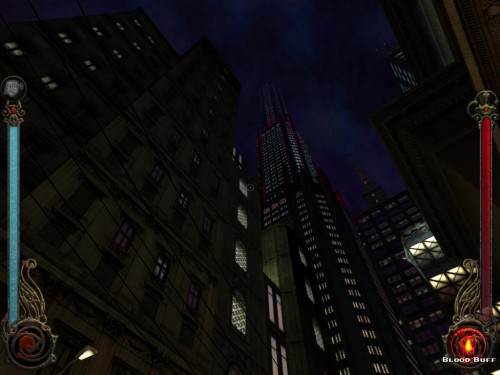

Downtown LA is a pretty imposing place, but it helps to use the well-placed street maps at bus stops
Street Fighting Man
When Bloodlines was first announced, some people were rather worried about the action focus the game was apparently going to have. Instead of the good old fashioned turn-based combat some would have liked to see or even the real time with pause system that seems to be standard in RPGs today, Bloodlines features very action driven combat. Whether you use firearms and fight from a first person perspective or use melee weapons in the third person view, the combat is very much twitchy and reflex-based. Fortunately, it's reasonably well done. Another amusing side effect of vampirism is supernatural strength and this is capably reflected by the game's combat. Solid hits from your melee weapon will send enemies flying into the air to slide down a nearby wall. Essentially, you really do get to kick some ass in Bloodlines. The various combat disciplines also mostly tie into combat. Potence makes those who can use it even stronger than usual, making you really deadly in combat. Celerity will likely remind you of the bullet time effect from the Matrix movies when you use it to dodge bullets or run up to an enemy and tear off his face before he has time to unstrap his shotgun. There are some balance issues, however. Celerity is possibly the most powerful discipline in the game. At higher levels of the power, your character gets so fast that with speedy weapons, he can deliver astounding numbers of attacks in a brief time. The Brujah clan, whose disciplines include both Potence and Celerity, are probably the easiest clan to play Bloodlines with.
Now that last statement might raise a question: how come the super combat character is the easiest to play? Aren't stealth and diplomacy, for which the Nosferatu and Ventrue respectively might be better suited, also good ways to play the game? Well, not really. Much like many other RPGs, Bloodlines' combat will likely make or break the game for many people. Simply put, you'd better like the combat, because there's very, very much of it coming at you. Most of the sidequests in the game--particularly those from the first part of the game, Santa Monica--are very, very well designed and offer all sorts of possibilities for completing them. Be you a sneaky type, a silver tongued diplomat or just the kind of vampire who smacks down what gets in between you and your objective, many of the game's sidequests will provide for you. However, later on in the game, you'll find that more and more, you won't have any choice but to crack open a can of whupass and fight your way to a quest solution. But that's not so bad, really. It happens too often and can leave characters who aren't good at combat out in the cold, but you can't expect to get to do all the sidequests in a big RPG, although combat characters probably will. One of the most annoying bits of railroading that the game will pull on you is occasional doors that simply cannot be lockpicked, no matter how skilled you are. Either they are protected by keycard locks that are apparently infallible or they have some kind of magic lock that your character won't even attempt to open. Why? Well, because the door is designated as unpickable in order to force you to go the long way around, through all the cannon fodder enemies, or to wait until someone hands you the special key, usually because there will be a quest related to the area behind this door somewhere along the road. It's pretty lame design for what wants to be a really open ended RPG and shows how much the game favors combat characters.
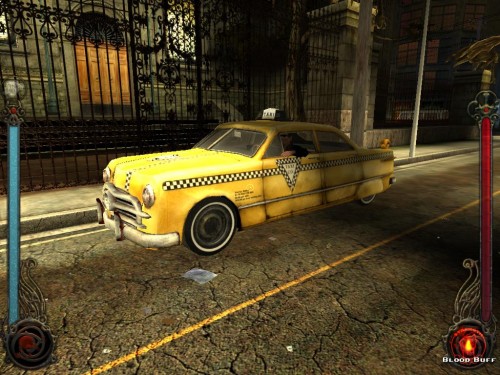

The faithful steed that will take you to the city's various areas and my preferred way of solving the littering and homelessness problems at the same time
The big problem is that starting somewhere around the middle of the game, virtually all the main plot quests become wholly combat driven. Without decent combat skills, you won't get far in Bloodlines, and if you're not supremely skilled at fighting by the end of the game, you simply won't be able to finish. The end of the game is just one extended combat sequence after another. This wouldn't be so bad if many of these sequences didn't feature really awful design decisions like infinitely respawning enemies. This makes some kind of sense in different quests where you face hordes of zombies, which could conceivably get back up after you cut them down. But when you're fighting an effectively infinite army of sword and crossbow wielding monks, you have to wonder: where the hell are all these guys coming from and how do they fit into this cramped area you're trudging through? Hell, if this faction has got so many of these highly trained guys, why haven't they already taken over the entire city without bothering with all the political silliness the plot exposes. The last handful of quests in the game are so poorly designed as to be outright irritating (designer pro tip: never make your game irritating). So much so, in fact, that I went ahead and turned on the god mode cheat rather than slog through these painful combat levels--wait, sorry. I'm sure I meant quests. You don't get levels in RPGs, do you? Well, the last bits of Bloodlines might as well be. It's a really disappointing way to end a game that starts really strongly.
There are a few main plot quests that aren't just hackfests, but these are very rare past the early portions of the game. One very good quest has you exploring a haunted hotel looking for a particular item in order to remove the ghost haunting the place. The hotel is very well done and is actually quite creepy, with a ghost flinging vases, lamps and other bits of this or that at your character as you explore the building. It's a genuinely fun level. The problem is that it'll probably only be fun the first time. Given that the quest is mandatory, it'll probably eventually become something of a chore when replaying the game. The same can be said of a later quest when you're exploring a large mansion owned by a vampire of the eccentric (well, totally loony) Malkavian clan. The mansion is filled with puzzles and trick rooms which can be amusing the first time (though some people really hate that kind of thing, especially since it doesn't make so much sense in context), but will also likely become an annoyance when repeated and don't really make much sense. I mean, wouldn't the contractor start asking himself some serious questions when he got the building plans for the place? "I'm sorry, sir, but what exactly do you need the secret bookcase door and lighting rod room for again?" Some of the other non-combat quests are stealth driven quests. Personally, I've always hated stealth missions in games. They really irritate the hell out of me. That's why whenever possible, I'll turn stealth missions into kill everything missions because hey, they can't have seen me if I murder them, right? But past a certain point in the game, even stealth won't help you much. You'll just be swarmed with enemies or delightful boss monsters so that you can't possibly sneak past anymore. A character in Bloodlines who can't fight really well is screwed pretty hard.
What can be still more frustrating is that because of a few bits of really boneheaded design, only certain types of combat characters will be able to progress. Moderately late in the game, there's a puzzle with a spinning blade room (that's pretty bad already, if you ask me) that you can only get out of by either shooting out a vague piece of equipment that's behind a grating or knocking down that grating with a sledgehammer and then smashing the vague piece of equipment. Well, that's great, but what if I'm a melee character who uses a sword instead of a sledgehammer and never carries guns? Or what if I'm a Gangrel or Nosferatu and prefer to use my claws to any weapon? Essentially, you're boned. That's not good at all.
19th Nervous Breakdown
One of the more ostentatiously touted features in Bloodlines is its use of the Source Engine, developed by Valve Software for use in their massively anticipated Half Life 2. Source's main features are a very powerful physics engine and terrific graphics. The former isn't really used all that much in Bloodlines. Occasionally, you get to knock over a chair or throw a soda can around, but the physics are very intermittently implemented. In a single office room, you'll likely find one chair that you can toss around--and three or four others that are stuck exactly where they are. In any case, the physics never really matter much to gameplay. While throwing an old TV and other urban debris at hobos is quite amusing ("Anyone have a menorah?" quips a demented elderly homeless woman. No, but I CAN FLING THIS SHOPPING CART AT YOU!), but it's not as fun when the junk bounces off the hobo's outrageously large hitbox with no effect. Which is another wonky thing about Bloodlines' physics. All characters in the game seem to occupy an enormous area in the game world that the actual model doesn't. Occasionally, you'll see an NPC standing in a doorway. At first sight, it'll look like there's ample room to pass, but if you try it, you find that that NPC's hitbox is so big that he occupies the whole doorway. Funnier still is when you see someone leaning against a wall with about a foot of empty space between the model and the wall. There's also a few points in the game where a sheet of plywood blocks your progress through a hole in the wall. Bloodlines will let you pick it up and toss it aside, but it's pretty iffy. Moving large objects around with the game's physics is very clunky, mostly because said objects seem to collide with every pixel in the game, causing the sheet of plywood to oscillate left to right as if it had been shoved in a paint mixer and making a ridiculous racket that makes anyone trying to sneak past the horde of monsters kind of jumpy.
The fancy graphics of Source do make something of an appearance, though. Particularly with the faces and their animations, Bloodlines looks pretty good. It's not quite on par with Half Life 2 or other games that are graphically very flashy, but it's easy on the eyes nonetheless. The downside to this is that the game has some serious performance issues. Load times can be a real pain, especially since you'll be traveling between areas a lot in the game. Also, the game just runs pretty slow in general, on most any computer. The game also fails to provide sufficient graphical options to allow the player to better fine tune performance vs. graphical quality.
The sound in Bloodlines is generally pretty good. The voice acting is quite good, an enormous improvement from Temple of Elemental Evil's *ahem* less than stellar voiceover work. This is quite fortunate for gamers given that every character in the game is fully voiced. The ambient music is largely unremarkable and somewhat forgettable, though some tracks seem to echo the soundtrack from Fallout. The game also makes a big deal about featuring a dozen or so songs from "popular" gothy bands that are played in the various clubs and bars in the game, but these aren't really anything too remarkable either. The worst thing about the sound is that turning on advanced audio features not only sounds terrible, giving NPC voices an entirely inappropriate echo even in small rooms, it also causes a huge performance hit.
Even the biggest fans of Temple of Elemental Evil (no, really, the game actually has fans) admit that the game was plagued by a bad bug problem. The situation isn't as bad in Bloodlines but it's dismaying to note that the game does have bugs and they are fairly annoying. There aren't the same endless hard crashes ToEE players encountered and the bugs generally aren't nearly as severe, but they exist and can be bothersome. Graphical glitches abound, mostly clipping issues. Occasionally, you'll get a crash when loading a new area. Perhaps the most annoying bug I've run into is save games unpredictably getting corrupted. You'll have saved your game when you left off last time and when you come back, attempting to load that save will crash the game. Fortunately, Bloodlines doesn't replace quick saves when you make them and also auto saves frequently (and doesn't replace autosaves, either, or at least not often), so you probably won't lose much progress when this bug hits you, but it's still annoying. A number of people also report a big game-stopping bug towards the end of the game that requires a bit of console hacking to fix. It's just not acceptable to ship a game with a bug like that, even if it only hits a minority of people. There's also a number of plain odd errors. For example, at one point in the game, there are locked doors you cannot enter. If you try, a guard posted next to it will say, "Sorry, you can't go in there" or something to that effect. However, if you kill that guard and then try to open the door--some invisible ghost of the guard (I think that they're called "bad level script" in the mythos) will tell you "Sorry, you can't go in there" anyways. It's that kind of unpolished quality that plagues Troika's games. In terms of bugginess, Bloodlines isn't as bad as ToEE, but it's still just not up to the standard that's expected from major releases.
The interface in general works just fine. You can play from first person or third and you navigate with traditional WADS controls. The quest log is particularly well done. It divides all your quests into the game's four hubs and helps you keep track of the latest development in an ongoing quest so you always have a sense of direction. It also keeps track of which quests you successfully complete and which ones you screw up. You can browse through your inventory to look for that blood pack you want to chug on or to compare weapons statistics, but you can also just use the F-keys to flip through melee weapons, firearms and armor at any time, and the mousewheel scrolls through disciplines. One bothersome problem with the inventory, though: for some reason, your character can only ever carry one of any given type of weapon. The idea is ostensibly to stop your character from becoming a walking arsenal, but you'll pretty much become one anyways. In any case, if my character can carry four different pistol, two Uzis, an assault rifle, a flamethrower, two different shotguns (one's automatic!), one or two sniper rifles, a baseball bat, a knife, a sledgehammer, a fire axe and a katana all at the same time, how come I can't toss a few thirty eights and tire irons in my back pocket for some cash early on in the game?
You Can't Always Get What You Want
Vampire: The Masquerade - Bloodlines is a different game at different times. In the beginning of the game and in fact through most of it, it's really very good. The story is interesting, the quests are well made, the NPC dialog is good and the combat is fun. But occasionally, a particularly boneheaded design decision like endlessly respawning enemies (which occurs far too often in this game) or magical unpickable superlocks and you can't help but be unhappy with the game. The real problem with Bloodlines is that the game is at its worst towards the end, which is naturally the portion of which gamers will most freshly remember after finishing it. Looking back on the last couple hours of gameplay in Bloodlines really makes me want to groan. But if you think back farther, to the well designed areas and the fun quests and the interesting NPCs that the game really does have in spades, the game starts looking good again.
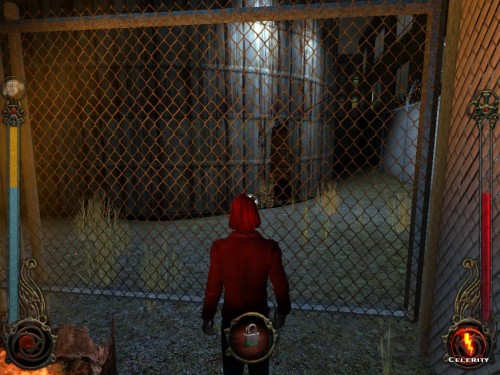
This fence must have some pretty powerful spell on it, because I won't be able to get past it
until I accomplish a long quest for someone, at which point it'll happily swing open for me
All in all, Bloodlines is a very good game. The problem is that it really isn't the great game we were hoping to get. There's two ways to look at Bloodlines. Either it's a decent RPG with the odd really crappy bit or it's a quite excellent action RPG that offers freedom and interactivity never before seen in that kind of game. In any case, it is a good game that probably should be played by fans of RPGs, fans of action games and fans of Vampire: The Masquerade, but we're still waiting for the next big game, the real successor to Fallout, and Troika has yet to prove they're the people we should be looking to in order to get it.
It was around this time last year that Troika Games released their second game, Temple of Elemental Evil. The game, publisher and largely the teams are all different, but the stakes for the company seem about the same. Both games follow a Troika title that wasn't quite as good or successful as fans--and those who certainly aren't fans--would have liked them to be. Both games are a chance for the company to really make a name for itself and show that years after Fallout, the game that got it all right, and Arcanum, the game that got lots of it right, the Troika team still had it. And, unfortunately for this new game, Vampire: The Masquerade - Bloodlines, both games, while being quite good in their own right, don't fully make up for all the mistakes made in the company's previous effort and, woefully, make new ones of their own.
There lies a special challenge in reviewing a game about vampires like Bloodlines that you don't get when reviewing other games. I am talking, of course, about avoiding painfully obvious and terrible puns about vampires. Thus, I am determined to avoid the use of phrases like "sink my teeth into this ambitious title" or "this game bites--literally!"
Midnight Rambler
Bloodlines takes its interesting and well-developed setting from the popular and eponymous Vampire: The Masquerade pen and paper RPG by White Wolf. The world of V:tM is one where vampires, among other creepie crawlies, actually do exist among us. Being aware, however, of the fact that they're grossly outnumbered and outgunned by humanity, the vampires of this fictional reality have devised a great big plan to hide themselves from mortals called the Masquerade. Ruthlessly enforced by a central vampire authority called the Camarilla, the Masquerade ensures that regular people don't catch on to the existence of the undead and start stabbing the eerily pale among us with broken pool cues and other handy pointy wooden objects. Of course, not all vampires comply with the Camarilla's laws, and from there we get a storyline.
The advantage to using an existing setting is that, hopefully, what you're getting is a superbly fleshed out, detailed, deep and well thought out game world, and White Wolf does deliver on this. Even if you're really not into vampires at all, you can't help but be intrigued by the complex politics and secret society skullduggery that the game's vampires incessantly engage in. Troika also does a good job of giving the game more of an urban underworld feel than a depressing (or rather hilarious) goth ambiance. Perhaps the most appealing thing about this setting is that it's not the same old elf-and-dwarf fantasy world that's been inflicted upon RPG fans for years.
The narrative that unfolds as the game progresses is equally interesting, although some of the endings are very weak and fail to provide the resolution that is built up to by the game's last few sequences. For most of the game, though, the story will keep you interested. The game begins with your character being seduced by a mysterious person of the opposite sex and then illegally sired, or made into a vampire. The Camarilla, who strictly regulate the creation of new vampires as well as several other aspects of vampire life, immediately intervene. Your sire and yourself are brought before Prince LaCroix, the leader of the Camarilla vampires in Los Angeles, the California metropolis where the game takes place. Your sire is swiftly executed for his/her transgression against the Masquerade. The prince is about to do the same to you when Nines Rodriguez, leader of the Anarch faction of vampires, who refuse to submit to Camarilla rule and represent a fair part of Los Angeles' vampires, intervenes to save your life. The prince then decides to show mercy and lets you live with the condition that you work for him to repay him for your (un)life. From there, the plot of the game takes off as the prince sends you on a series of missions which largely revolve around an ancient artifact recently arrived in the city that is somehow related to a large and dramatic event called Gehenna, the vampire apocalypse. Much of the game centers on this object and the various vampire faction's efforts to grab it in order to do what they want with it, but the artifact really only serves as a catalyst for the struggle over the control of LA's vampire underworld between the various sects of the city, which is where the real meat of the story is.
In general, the storyline is very tight and interesting, taking you through a whirlwind of backstabbing, deception, duplicity, manipulation and all the other things that make up a good politics-driven storyline, but there's a price to pay for that: it's largely set in stone. Regardless of what factions you pick or decisions you make, your course through the gameworld won't significantly change. You can downright curse out the prince and he'll still just send you out on another quest. It's only right near the end of the game that you actually get to decide how the plot will end, and this choice is totally independent of your prior actions and choices. You just choose a particular choice in a dialog and you've picked your ending. The story does a good job of offering a valid reason why the loyalties you've held through the entire game might change, but that the story only hinges on one or two choices is disappointing.


Gotta love the swingin' vampire nightlife. All the sly political humor is getting in the way of the JiggleTech demo, though
The characters are well developed and engaging, with a lot of memorable personalities (Officer Chunk is my personal favorite). Probably one of the more important reasons why the NPCs in Bloodlines seem so fleshed out is because each one of them is fully voiced and has a fully animated face, much like BioWare's Star Wars: Knights of the Old Republic. The difference, though, is that every important NPC in Bloodlines gets a unique and superbly rendered face. Great writing and characters always helps and the game has certainly got both, but Bloodlines' skillful use of facial animation technology and generally good voice acting really help the NPCs shine in dialog.
On the positive side, Bloodlines does deserve some praise for how the game world reacts to your various actions. In dialog, NPCs will sometimes offer different responses based on your past actions. What's especially neat is that Bloodlines features a TV newscast for the Los Angeles area with many stories that directly relate to you and the things you've been doing in the game. After you complete a particularly remarkable quest (like causing certain large explosions in certain places), it'll probably end up on the news. It's really neat to be investigating a serial killer and finding new murder scenes and having the reporter on TV be right behind you with a story about the new body. You can even get quests from the television. It's pretty easy to do but it does wonders for immersion. Another fun thing in the game is a Grand Theft Auto-style talk radio station you can listen to if you find a radio. This won't react to your actions like the TV will, but it's good for a laugh. Finally, in the game, you are given an apartment or two (called your "haven") where you have a computer. You can check your email and actually get quests through it. It's a really well implemented gameplay element and just makes sense in a modern-day setting game.


A shot of the lovable eyepatch wearing arms herbal remedies dealer and something those remedies would have been handy for
Start Me Up
Along with the setting, Bloodlines takes from the pen and paper Vampire: The Masquerade much of its rule system. Vampire's system isn't quite as detailed as other systems like Dungeons & Dragons, but it still works. In any case, a rules light system is probably best for a game like Bloodlines, which is going to toss out a lot of those rules to replace them with its own actiony combat system--more on that later.
The rule system used here is simple, intuitive and functional, which is always good. Characters will get attributes and skills they can spend points on. Attributes are things like your strength, your dexterity, your wits, your perception, your appearance and others. These essentially represent your inherent nature and each ranges from one to five. Your character's skills are abilities that you might learn as you go through your unlife, like brawling, scholarship, security (lockpicking), hacking, ranged combat (guns) and others. Skills also range from one to five. Each attribute and skill contribute to your total rating in a feat. For example, your melee feat, which is the statistic that reflects your skill at fighting with weapons, is the sum of your strength attribute and your melee skill. Your hacking feat is the sum of your wits attribute and computer skill. The various combat feats affect how good you are at hurting others and avoiding being hurt yourself. The rest of your feats are checked against the difficulty of various actions in the world. Hacking this computer or convincing that thug to let you past him will have a particular minimum skill rating attached to it and if you equal or surpass that skill, you've succeeded.


The game is full of little jokes like these, with references to the developers being particularly rampant
Inherently, being a vampire is kind of a raw deal. You get really pale, creepy and develop a taste for blood. The trade off is eternal life--which is okay, I guess--and superpowers, which the game calls disciplines. When creating your character, you pick one of seven clans to become a member of. Your choices here reflect a fairly broad range of RPG archetypes. You can play a Brujah, passionate, violent types who excel at combat. The Gangrel are vampires who who identify with animals and the Beast inside all vampires that represents the instinctual hunger for blood. Their powers include the ability to summon animals to help defeat enemies. Malkavians are insane vampires with a twisted insight into events. What's interesting about being Malkavian is that your character effectively will be a complete lunatic and your dialog options will reflect this, which is really great. Unfortunately, as you progress through the game and approach the final areas, it seems less and less effort was invested into Malkavian dialog and their general insanity and your gameplay experience loses that completely loopy charm. Nosferatu are Kindred twisted by the blood curse into horrific and ugly monsters who excel at stealth and information gathering. Toreador are passionate artists and thrive in human society (as long as it's at night). The Tremere are magicians who have developed a blood magic called Thaumaturgy. Finally, The Ventrue are the political leaders of the Camarilla and excel at politics and negotiation. Each clan has some bonuses or penalties associated with it (for example, since they spend so much time studying their magic, the Tremere clan's physical statistics can never rise above four). More importantly, however, each clan gets a set of three disciplines (along with one discipline, blood buff, that all vampires get which improves your physical statistics). This makes your choice of clan probably the most important choice you'll make when creating your character, and this is mostly because each clan gets a particular set of disciplines.
The Brujah clan gets Celerity, Potence and Presence. Respectively, these disciplines give you super speed, super strength or debuff enemies. The Brujah are thus ideal fighters. Gangrel get Animalism, allowing them to summon supernatural animals, Fortitude, which makes them tougher in combat and Protean, which lets them assume characteristics of animals, increasing their effectiveness in combat. Malkavians, in accordance with their insanity, can use Auspex, which increases perception and wits and also lets you see the aura of creatures (essentially lets you identify who is attacking you and isn't really useful since those who are attacking you will generally attack you), Dementation, a powerful discipline that lets them inflict their madness on others around them in a number of delightfully horrible ways and Obfuscate, which is more or less invisibility. The Nosferatu have access to Animalism, Obfuscate and Potence, which lets them be stealthy quite effectively but also lets them kick some butt when necessary. The Toreador disciplines are Auspex, Celerity and Presence (little tip: focus on Celerity--the other two aren't terribly good), which doesn't reflect their social skills all that well, but does make them pretty effective in combat. The Tremere, the blood mages, get Auspex, Dominate, a power much like Dementation but without the theme of insanity and Thaumaturgy, the blood magic, which largely focuses on killing enemies. Finally, the politically minded Ventrue get Dominate, Fortitude and Presence. Once again, the selection of disciplines each clan gets is their main defining characteristic. A Ventrue will play completely differently from a Brujah not so much because the Ventrue are incapable of feeding on rats and the Brujah are prone to Frenzying a lot but rather because the Brujah disciplines allow that clan to really tear it up in combat while a Ventrue character will likely have to be more subtle, using persuasion and Domination to get his way.
Throughout the game, you gain experience for accomplishing quests, which you then spend to improve your skills and disciplines, which also are rated from one to five, with all vampires starting with one point in the disciplines of the chosen clan. This system really works quite well. It strikes an important balance in an RPG system. It manages to be complete enough to fully describe a wide variety of characters (do you want to play a swordsman who excels at hacking his enemies to bit? Or perhaps a hand cannon toting badass? Or maybe a smooth operator who can convince his foes to do as he wants? Well, tough luck on that last one, but more on that later) while still being simple enough that you can instantly see what effect spending your points here or there will have on your character.


Downtown LA is a pretty imposing place, but it helps to use the well-placed street maps at bus stops
Street Fighting Man
When Bloodlines was first announced, some people were rather worried about the action focus the game was apparently going to have. Instead of the good old fashioned turn-based combat some would have liked to see or even the real time with pause system that seems to be standard in RPGs today, Bloodlines features very action driven combat. Whether you use firearms and fight from a first person perspective or use melee weapons in the third person view, the combat is very much twitchy and reflex-based. Fortunately, it's reasonably well done. Another amusing side effect of vampirism is supernatural strength and this is capably reflected by the game's combat. Solid hits from your melee weapon will send enemies flying into the air to slide down a nearby wall. Essentially, you really do get to kick some ass in Bloodlines. The various combat disciplines also mostly tie into combat. Potence makes those who can use it even stronger than usual, making you really deadly in combat. Celerity will likely remind you of the bullet time effect from the Matrix movies when you use it to dodge bullets or run up to an enemy and tear off his face before he has time to unstrap his shotgun. There are some balance issues, however. Celerity is possibly the most powerful discipline in the game. At higher levels of the power, your character gets so fast that with speedy weapons, he can deliver astounding numbers of attacks in a brief time. The Brujah clan, whose disciplines include both Potence and Celerity, are probably the easiest clan to play Bloodlines with.
Now that last statement might raise a question: how come the super combat character is the easiest to play? Aren't stealth and diplomacy, for which the Nosferatu and Ventrue respectively might be better suited, also good ways to play the game? Well, not really. Much like many other RPGs, Bloodlines' combat will likely make or break the game for many people. Simply put, you'd better like the combat, because there's very, very much of it coming at you. Most of the sidequests in the game--particularly those from the first part of the game, Santa Monica--are very, very well designed and offer all sorts of possibilities for completing them. Be you a sneaky type, a silver tongued diplomat or just the kind of vampire who smacks down what gets in between you and your objective, many of the game's sidequests will provide for you. However, later on in the game, you'll find that more and more, you won't have any choice but to crack open a can of whupass and fight your way to a quest solution. But that's not so bad, really. It happens too often and can leave characters who aren't good at combat out in the cold, but you can't expect to get to do all the sidequests in a big RPG, although combat characters probably will. One of the most annoying bits of railroading that the game will pull on you is occasional doors that simply cannot be lockpicked, no matter how skilled you are. Either they are protected by keycard locks that are apparently infallible or they have some kind of magic lock that your character won't even attempt to open. Why? Well, because the door is designated as unpickable in order to force you to go the long way around, through all the cannon fodder enemies, or to wait until someone hands you the special key, usually because there will be a quest related to the area behind this door somewhere along the road. It's pretty lame design for what wants to be a really open ended RPG and shows how much the game favors combat characters.


The faithful steed that will take you to the city's various areas and my preferred way of solving the littering and homelessness problems at the same time
The big problem is that starting somewhere around the middle of the game, virtually all the main plot quests become wholly combat driven. Without decent combat skills, you won't get far in Bloodlines, and if you're not supremely skilled at fighting by the end of the game, you simply won't be able to finish. The end of the game is just one extended combat sequence after another. This wouldn't be so bad if many of these sequences didn't feature really awful design decisions like infinitely respawning enemies. This makes some kind of sense in different quests where you face hordes of zombies, which could conceivably get back up after you cut them down. But when you're fighting an effectively infinite army of sword and crossbow wielding monks, you have to wonder: where the hell are all these guys coming from and how do they fit into this cramped area you're trudging through? Hell, if this faction has got so many of these highly trained guys, why haven't they already taken over the entire city without bothering with all the political silliness the plot exposes. The last handful of quests in the game are so poorly designed as to be outright irritating (designer pro tip: never make your game irritating). So much so, in fact, that I went ahead and turned on the god mode cheat rather than slog through these painful combat levels--wait, sorry. I'm sure I meant quests. You don't get levels in RPGs, do you? Well, the last bits of Bloodlines might as well be. It's a really disappointing way to end a game that starts really strongly.
There are a few main plot quests that aren't just hackfests, but these are very rare past the early portions of the game. One very good quest has you exploring a haunted hotel looking for a particular item in order to remove the ghost haunting the place. The hotel is very well done and is actually quite creepy, with a ghost flinging vases, lamps and other bits of this or that at your character as you explore the building. It's a genuinely fun level. The problem is that it'll probably only be fun the first time. Given that the quest is mandatory, it'll probably eventually become something of a chore when replaying the game. The same can be said of a later quest when you're exploring a large mansion owned by a vampire of the eccentric (well, totally loony) Malkavian clan. The mansion is filled with puzzles and trick rooms which can be amusing the first time (though some people really hate that kind of thing, especially since it doesn't make so much sense in context), but will also likely become an annoyance when repeated and don't really make much sense. I mean, wouldn't the contractor start asking himself some serious questions when he got the building plans for the place? "I'm sorry, sir, but what exactly do you need the secret bookcase door and lighting rod room for again?" Some of the other non-combat quests are stealth driven quests. Personally, I've always hated stealth missions in games. They really irritate the hell out of me. That's why whenever possible, I'll turn stealth missions into kill everything missions because hey, they can't have seen me if I murder them, right? But past a certain point in the game, even stealth won't help you much. You'll just be swarmed with enemies or delightful boss monsters so that you can't possibly sneak past anymore. A character in Bloodlines who can't fight really well is screwed pretty hard.
What can be still more frustrating is that because of a few bits of really boneheaded design, only certain types of combat characters will be able to progress. Moderately late in the game, there's a puzzle with a spinning blade room (that's pretty bad already, if you ask me) that you can only get out of by either shooting out a vague piece of equipment that's behind a grating or knocking down that grating with a sledgehammer and then smashing the vague piece of equipment. Well, that's great, but what if I'm a melee character who uses a sword instead of a sledgehammer and never carries guns? Or what if I'm a Gangrel or Nosferatu and prefer to use my claws to any weapon? Essentially, you're boned. That's not good at all.
19th Nervous Breakdown
One of the more ostentatiously touted features in Bloodlines is its use of the Source Engine, developed by Valve Software for use in their massively anticipated Half Life 2. Source's main features are a very powerful physics engine and terrific graphics. The former isn't really used all that much in Bloodlines. Occasionally, you get to knock over a chair or throw a soda can around, but the physics are very intermittently implemented. In a single office room, you'll likely find one chair that you can toss around--and three or four others that are stuck exactly where they are. In any case, the physics never really matter much to gameplay. While throwing an old TV and other urban debris at hobos is quite amusing ("Anyone have a menorah?" quips a demented elderly homeless woman. No, but I CAN FLING THIS SHOPPING CART AT YOU!), but it's not as fun when the junk bounces off the hobo's outrageously large hitbox with no effect. Which is another wonky thing about Bloodlines' physics. All characters in the game seem to occupy an enormous area in the game world that the actual model doesn't. Occasionally, you'll see an NPC standing in a doorway. At first sight, it'll look like there's ample room to pass, but if you try it, you find that that NPC's hitbox is so big that he occupies the whole doorway. Funnier still is when you see someone leaning against a wall with about a foot of empty space between the model and the wall. There's also a few points in the game where a sheet of plywood blocks your progress through a hole in the wall. Bloodlines will let you pick it up and toss it aside, but it's pretty iffy. Moving large objects around with the game's physics is very clunky, mostly because said objects seem to collide with every pixel in the game, causing the sheet of plywood to oscillate left to right as if it had been shoved in a paint mixer and making a ridiculous racket that makes anyone trying to sneak past the horde of monsters kind of jumpy.
The fancy graphics of Source do make something of an appearance, though. Particularly with the faces and their animations, Bloodlines looks pretty good. It's not quite on par with Half Life 2 or other games that are graphically very flashy, but it's easy on the eyes nonetheless. The downside to this is that the game has some serious performance issues. Load times can be a real pain, especially since you'll be traveling between areas a lot in the game. Also, the game just runs pretty slow in general, on most any computer. The game also fails to provide sufficient graphical options to allow the player to better fine tune performance vs. graphical quality.
The sound in Bloodlines is generally pretty good. The voice acting is quite good, an enormous improvement from Temple of Elemental Evil's *ahem* less than stellar voiceover work. This is quite fortunate for gamers given that every character in the game is fully voiced. The ambient music is largely unremarkable and somewhat forgettable, though some tracks seem to echo the soundtrack from Fallout. The game also makes a big deal about featuring a dozen or so songs from "popular" gothy bands that are played in the various clubs and bars in the game, but these aren't really anything too remarkable either. The worst thing about the sound is that turning on advanced audio features not only sounds terrible, giving NPC voices an entirely inappropriate echo even in small rooms, it also causes a huge performance hit.
Even the biggest fans of Temple of Elemental Evil (no, really, the game actually has fans) admit that the game was plagued by a bad bug problem. The situation isn't as bad in Bloodlines but it's dismaying to note that the game does have bugs and they are fairly annoying. There aren't the same endless hard crashes ToEE players encountered and the bugs generally aren't nearly as severe, but they exist and can be bothersome. Graphical glitches abound, mostly clipping issues. Occasionally, you'll get a crash when loading a new area. Perhaps the most annoying bug I've run into is save games unpredictably getting corrupted. You'll have saved your game when you left off last time and when you come back, attempting to load that save will crash the game. Fortunately, Bloodlines doesn't replace quick saves when you make them and also auto saves frequently (and doesn't replace autosaves, either, or at least not often), so you probably won't lose much progress when this bug hits you, but it's still annoying. A number of people also report a big game-stopping bug towards the end of the game that requires a bit of console hacking to fix. It's just not acceptable to ship a game with a bug like that, even if it only hits a minority of people. There's also a number of plain odd errors. For example, at one point in the game, there are locked doors you cannot enter. If you try, a guard posted next to it will say, "Sorry, you can't go in there" or something to that effect. However, if you kill that guard and then try to open the door--some invisible ghost of the guard (I think that they're called "bad level script" in the mythos) will tell you "Sorry, you can't go in there" anyways. It's that kind of unpolished quality that plagues Troika's games. In terms of bugginess, Bloodlines isn't as bad as ToEE, but it's still just not up to the standard that's expected from major releases.
The interface in general works just fine. You can play from first person or third and you navigate with traditional WADS controls. The quest log is particularly well done. It divides all your quests into the game's four hubs and helps you keep track of the latest development in an ongoing quest so you always have a sense of direction. It also keeps track of which quests you successfully complete and which ones you screw up. You can browse through your inventory to look for that blood pack you want to chug on or to compare weapons statistics, but you can also just use the F-keys to flip through melee weapons, firearms and armor at any time, and the mousewheel scrolls through disciplines. One bothersome problem with the inventory, though: for some reason, your character can only ever carry one of any given type of weapon. The idea is ostensibly to stop your character from becoming a walking arsenal, but you'll pretty much become one anyways. In any case, if my character can carry four different pistol, two Uzis, an assault rifle, a flamethrower, two different shotguns (one's automatic!), one or two sniper rifles, a baseball bat, a knife, a sledgehammer, a fire axe and a katana all at the same time, how come I can't toss a few thirty eights and tire irons in my back pocket for some cash early on in the game?
You Can't Always Get What You Want
Vampire: The Masquerade - Bloodlines is a different game at different times. In the beginning of the game and in fact through most of it, it's really very good. The story is interesting, the quests are well made, the NPC dialog is good and the combat is fun. But occasionally, a particularly boneheaded design decision like endlessly respawning enemies (which occurs far too often in this game) or magical unpickable superlocks and you can't help but be unhappy with the game. The real problem with Bloodlines is that the game is at its worst towards the end, which is naturally the portion of which gamers will most freshly remember after finishing it. Looking back on the last couple hours of gameplay in Bloodlines really makes me want to groan. But if you think back farther, to the well designed areas and the fun quests and the interesting NPCs that the game really does have in spades, the game starts looking good again.

This fence must have some pretty powerful spell on it, because I won't be able to get past it
until I accomplish a long quest for someone, at which point it'll happily swing open for me
All in all, Bloodlines is a very good game. The problem is that it really isn't the great game we were hoping to get. There's two ways to look at Bloodlines. Either it's a decent RPG with the odd really crappy bit or it's a quite excellent action RPG that offers freedom and interactivity never before seen in that kind of game. In any case, it is a good game that probably should be played by fans of RPGs, fans of action games and fans of Vampire: The Masquerade, but we're still waiting for the next big game, the real successor to Fallout, and Troika has yet to prove they're the people we should be looking to in order to get it.
There are 22 comments on Vampire: The Masquerade - Bloodlines Review





